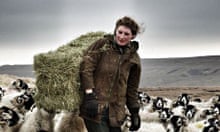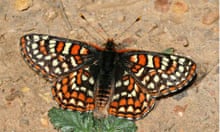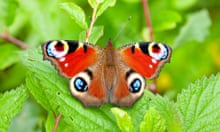Camilla Goddard was sitting in a deckchair when she experienced what most people would frantically air slap away but she took it as a career omen. "As I was chatting to my friend, a honeybee landed on one hand and a bumblebee on the other. It just happened and I read it as a sign I should go into beekeeping," she says.
Before Goddard's beekeeping hobby graduated to career level, she studied English and history of art at Cambridge University. After that she set up her own arts consulting company serving regeneration areas of London with public art. Goddard, 41, from Brockley south-east London wanted to do something that had a more sustainable element to it. "I felt like I wanted to have more meaning. Life isn't just doing one thing and that's it. You don't have to be one thing all the time."
She isn't exclusively a beekeeper, but bees are at the heart of her work. Along with beehive maintenance, Goddard visits schools and universities to give talks and educate people on the nature of bees, which is essential to make enough money. "You have to be a self-starter and business minded in this industry. In the first couple of years, you're not going to make a lot of money," she says. "I started making honey as a sideline hobby while I had my arts consulting business. It's very hard to start from scratch; you need to have some income to build it up."
It can take up to a month for bees to produce a few pounds of honey but Goddard lays the foundations to get the process under way "I put frames of wax in the hives to save the bees some time and they'll build cells from that. I'll then spin and filter the honey out at the end into sterilised jars." The honey from bees she keeps at St Ermin's Hotel in St James's Park ends up on the hotel's menus.
In the interim, Goddard surveys the activity, on the lookout for unusual behaviour and ill health. "I go through every hive and look to find an unusual breed pattern and make sure the queen bee is OK."
Bees are currently plagued with varroa mite in the UK, which she treats with a sprinkle of icing sugar. "I work symbiotically with the bees. I can tell if they're in distress or aggressive, or when they've lost motivation because they become like an agitated army. To calm them down I waft smoke over the top of the hive," she says.
The bees are very busy and perky as the temperature goes up. During the winter months a beekeeper's job plateaus but preparation for the forthcoming season is under way. "I'll make sure they have enough stores and haven't been snowed in. There'll be around 5,000 bees per hive in the colder months, which multiply to 10,000 in the springtime."
Understanding the temperamental nature of bees will take the sting out of the work. "You do give off an energy by the way that you deal with them. If you handle them with slow patient movement, they'll respond well. If you are rushing or fearful, it all becomes quite tense."
As well as managing urban beehives, Goddard is also on call for bumblebee rescue. "If there is a building or landscaping project, I'll be called to move a colony of bees in the roof to several miles away."
You have to be prepared for strange domestic situations where ignorance is commonplace. "I went to collect a swarm once and somebody had thrown bleach all over them in an attempt to kill them and then used wasp spray," she recalls.
"A colony of bees came down someone's chimney into a bedroom, and they were trapped because the owner didn't open the window. By the time I got there the bees were motionless and starving on the inside of the window so I put a box of honeycomb underneath and they immediately latched on to it."
Being receptive to the demands of the industry and bags of enthusiasm are essential if you want to make a sustainable career out of beekeeping. Environmental awareness is a natural prerequisite but you won't need formal qualifications to get started. Non-traditional routes will make you stand out, especially with transferable skills. The British Beekeepers Association offers events to get started.






Comments (…)
Sign in or create your Guardian account to join the discussion